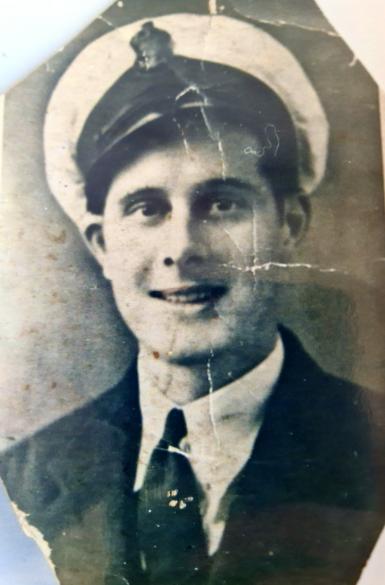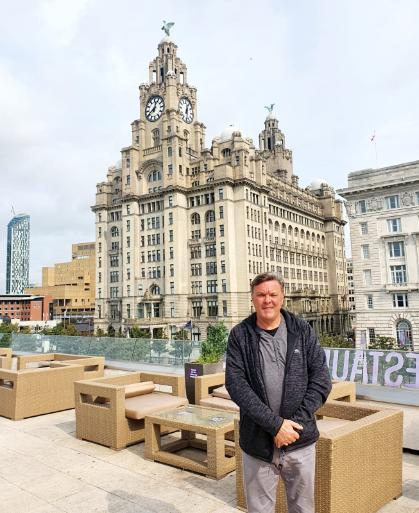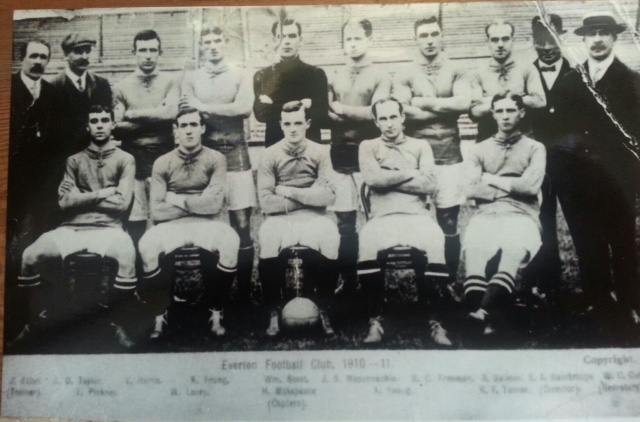The Football and War Story of the Ernest Pinkney Family
17/01/2023 - 12.28
Paul Sefton
My great grandfather Ernest Pinkney, also known as Ernie, was a professional footballer in the early 1900s. However, his life was very different to modern day professional footballers. Most notably, because his career was disrupted by World War One but also because he was one of the few players to play for the three Merseyside teams - Everton, Liverpool and Tranmere Rovers.
Ernest Pinkney, was not a scouser, he was born in Govan Hill, Glasgow on the 23rd November in 1887. His father, Thomas, was a railway guard. By 1901, the family had moved to West Hartlepool, where Thomas was then employed as a blast furnace labourer. Ernie started his footballing career as a 17-year old (1905), joining Baptist United as a centre forward, where he played for two seasons, scoring 39 goals in his first season.
By age 19 years (1907), he joined Christ Church where he played on the right wing. The following year he moved to West Hartlepool in the Wearside League, scoring 15 goals in his first season and a further 12 in his second season. This brought him to the attention of Everton FC scouts.
He was subsequently signed by Everton in February 1909, to be the successor to Everton’s retiring player Jack Sharp (300 appearances, 68 goals), [1]. Ernie boarded with fellow Everton players William Joseph Lacey and Edward Magner, at 37 Diana Street, next to Goodison Park [2]. These were very different living arrangements compared to modern day professional footballers. Their abode has since been consumed by the expanding Everton stadium where the street is now part of the club’s car park. Ernie was quite a small but fast player, 5 feet, 8 inches tall and weighed 10 stone, 4.5 pounds. He had won medals for running as a teenager.
-489x489.jpg)
Ernest Pinkney. Source: Play Up Liverpool
In total, Ernie made eight appearances and scored one goal for Everton between 1909 and 1911. However, he never reached the heights his predecessor had achieved at the club and subsequently he moved on to Barrow (1912) and then New Brompton (now known as Gillingham) between 1913 and 1915, where he made 63 apps and scored 13 goals. He played in the second round of the FA Cup for them on the 31st January, 1914, when they were knocked out by Liverpool FC, losing 2:0.
Everton FC Team Photo 1910/1911: Ernie - Front Row, First Left. Source: Pinkney Family Collection
Ernie later played as a “guest “footballer for Liverpool FC from 1915 to 1917, making 28 appearances and scoring three goals. Between 1915 and 1919 the Football League was suspended in England. Regional league competitions were introduced in its place. However, due to players signing up to fight, many teams were depleted and as a result clubs fielded guest players instead.
As a Liverpool fan myself, I still relish Ernie’s guest role for the club and in particular a game he played against Manchester United, covered by an article in the Liverpool Echo (31st January, 1916) with the headline - “Pinkney saves a point in Manchester". This followed a 1-1 draw at Old Trafford just two days earlier, in front of a crowd of 10,000. Cookson scored for Manchester United initially and Ernie then equalised for Liverpool shortly afterwards - “… from a swinging pass Pinkney pounced upon the leather and netted with a drive that gave the United keeper no chance". He also played in a derby game for Liverpool against Everton on 20th April, 1916 when Liverpool won 5 -2, which must have felt a “bittersweet" moment.
Ernie married Maud Alice Fairbrother (born 1890, died 1964), in Liverpool in 1913. They had two sons, Albert and Herbert and two daughters, Lillian and Ethel, between 1914 and 1923.
Ernest and Maud on their Wedding Day in Liverpool in 1913. Source: Pinkney Family Collection
In World War One, Ernie served in the Royal Engineers (as a Sapper) rising to the rank of Corporal (WR/260437 Army No: 20175). It is believed that he served at Ypres and took part at Passchendaele. He was presented with the British War and Victory Medals.
After World War One, Ernie pursued his professional footballer career again. He had a short stint at Tranmere Rovers and then joined newly promoted Halifax Town in July 1921, where he made 30 appearances and scored two goals. His last professional team was Accrington Stanley (1922) where he made 12 appearances and scored three goals.
He became a player/coach for Aintree SS (Merseyside) in 1931. Unlike modern day professional footballers there were no high level earnings to sustain you after your professional career. His second career was as a gardener. He had private clients and was also employed as a groundsman at Quarry Bank Boys High School in Liverpool (famously attended by John Lennon). Ernie unofficially coached the boys football team there!
Ernie lived a humble but happy life in a council house in the Old Swan, Liverpool. His house was heavily damaged in the May Blitz on Liverpool in World War Two. Its roof was blown off by a parachute mine landing nearby. His grand-daughter (my mother), aged two years, was found unconscious along with other relatives, following the blast but they all survived.
Both of Ernie's sons Albert Ernest (born 1916, died 1942) and Herbert Matthew (born 1920, died 2007) served in World War Two. Albert joined the Merchant Navy as an Ordinary Seaman (90206). He took part in the Dunkirk evacuations (I have been unable to obtain a record of the ship(s) he served on). Albert transferred to the Royal Navy (RN) as an Assistant Steward for the Naval Auxiliary Service (92437). He served on HMS Avenger, an Auxiliary Escort Carrier. The ship played an instrumental part in the success of Artic Convoy PQ 18 in September, 1942. HMS Avenger’s Sea Hurricanes flew regular sorties and drove off repeated aerial attacks, with 30 of her 41 merchantmen successfully reaching Archangel, in the USSR with vital war material.
After successfully escorting the OP14 convoy back to the UK and taking part in the Allied Operation Torch Landings in North Africa, HMS Avenger was torpedoed by U 155 west of Gibraltar on the 15th November, 1942. She sank quickly, with heavy loss of life. There were only twelve survivors from a crew of over 500. Albert was only 26 years old when he was killed in action. His death was a hard blow to his family, especially since he had been recently engaged to be married. His name is remembered on the Commonwealth War Graves Commission, Liverpool Naval Memorial (Panel 7 Column 1) at the Pier Head, Liverpool. Albert was awarded the 1939-45 War Medal and Star, the Africa Star, the Atlantic Star and in 2012, when the UK Government belatedly authorised the institution of the Arctic Star to remember those who served in the Arctic Convoys, the family obtained that medal on his behalf.

Albert Ernest Pinkney. Source: Pinkney Family Collection
Thankfully, Ernie's other son Herbert survived the war. He served as a Private (10541724) in the Royal Army Ordnance Corps from 1941 until his discharge in 1946. It's believed he served in North Africa and in Iraq. He was very sporty, like his father, winning medals in the Army for Football, Running and High jump events.
Ernie remained sporty all his life. He played Crown Green Bowls, alongside his wife Maud for which they won many trophies. On Maud's passing in 1964, Ernie continued to live independently in the same home, supported by his extended family who all lived nearby. On the 19th May, 1975, Ernie passed away peacefully.
Unfortunately, Ernie's football talent did not pass down through the family genes! The closest we have got it is that his great great grand-son Adam (my son) has been a football referee for a number of years. He is currently at Level 4 on the FA Referee’s Mentor scheme, so I am hoping to attend an FA Cup Final or even a UEFA Champions League Final, as his guest one day (fingers crossed).
References
[1] Sharp’s Successor - The Athletic News, 12/09/1910
[2] 1911 Census
Biography
Paul has been awarded a BA (Honours) degree in History and Politics and a Postgraduate Diploma. He has served in the public and uniformed services in the Royal Navy; as a police officer in the Metropolitan and Merseyside Police forces, and in the National Health Service.



/prod01/wlvacuk/media/departments/digital-content-and-communications/images-2024/240328-Varsity-Line-Up-Resized.jpg)
/prod01/wlvacuk/media/departments/digital-content-and-communications/images-18-19/220325-Engineers_teach_thumbail.jpg)
/prod01/wlvacuk/media/departments/digital-content-and-communications/images-2024/240515-Spencer-Jones-Award-Resized.jpg)
/prod01/wlvacuk/media/departments/digital-content-and-communications/images-2024/240320-Uzbekistan-Resized.jpg)
/prod01/wlvacuk/media/departments/digital-content-and-communications/images-2024/240229-The-Link-Resized.jpg)
/prod01/wlvacuk/media/departments/digital-content-and-communications/images-2024/240516-Andy-Gibson-Resized.jpg)

